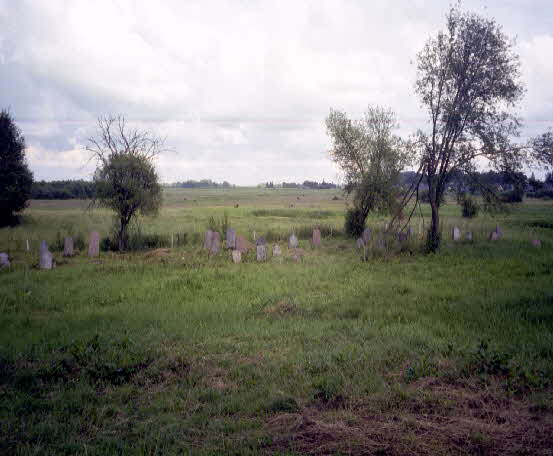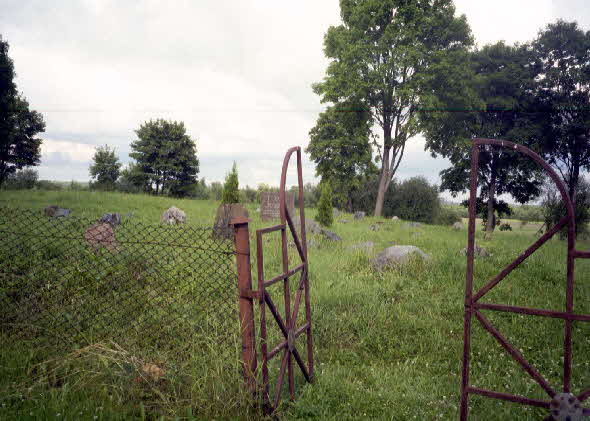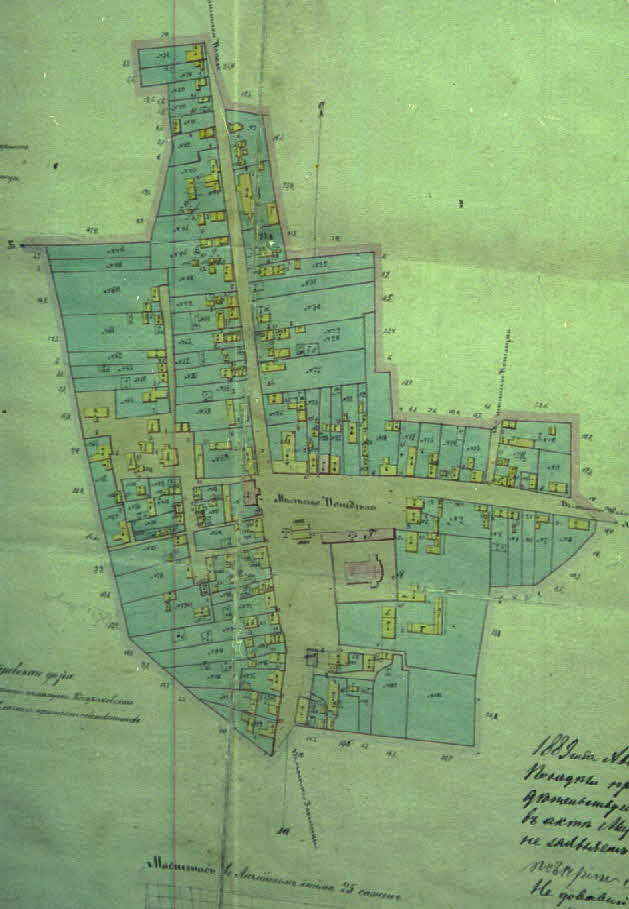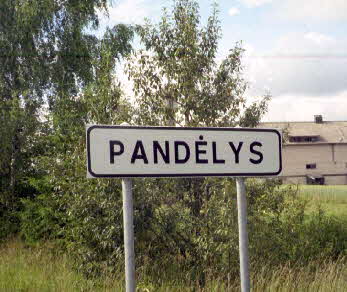Pandelys Yoffe Lithuania Weblog
| CEMETERY: Estimated 100 graves exist. Gated, but not locked. Source: Linda Cantor, lincan@amanda.dorsai.org [date? before 1997?] Photos. The cemetery is difficult to reach, Between fields and a dirt road, a chain link fence surrounds the site. [March 2009] |
| Last Updated on Tuesday, 31 March 2009 19:17 |
more pictures of pandelys
http://www.shtetlinks.jewishgen.org/pandelys/html/body_pictures.html
large Chassidic population. They were "heise" (fervent in Yiddish) Lubavitch Chassidim, with their own rabbi and shochetim. And this in a Lithuania whose cities and towns were decidedly not Chassidic. Rakishok arranged for the Lubavitcher Rebbi to visit Rakishok after he escaped from Russia and settled in Riga, Latvia's capital in 1915. Rakishok was proud that the Rebbi chose to stay there when he visited no other Lithuanian town or city, not even the large city of Kovno.
Rakishok's Jews were dedicated Torah Jews. Reb Bertchik Zalkind, a somewhat scholarly Jew, founded a yeshiva in Rakishok. Not only Rakishok boys studied there but also students from the nearby towns - Kamei, Fonedel, Abel, and Shvadost. The 60 students were taught by Rav Moshe Sidrer and the martyred Rav Mechel Veiner. Mr. Zalkind undertook to maintain the yeshiva students and the roshei yeshiva. Zalkind himself taught a daily shiur in the Mittelste Synagogue.
Tzipa YOFFE married Kham TRUPIN 1889 03/2 http://pagesperso-orange.fr/vishki/marriageseightynine.html
in DINABURG Daugavpils
[Page 331]
Ponedel
By R.H. Berchowitz-Peisachovitz, T. Katz, Jokl Evans
Donated by Lois Feldman Clausen
Translated from the Yiddish by Paul Silbert
Ponedel lies on the road from Rakishok to Birz. Before the First World War it was a muddy and neglected little town.
Ponedel is surrounded by the little towns of Suavenshki, Anushishok, Ponimunok, Skupishok and Papel. It is 28 kilometres from Rakishok.
Around Ponedel there is a chain of villages.
The centre was the market square. From Rakishok you used to come in through Main Street, which stretched as far as the market. A large and beautiful House of Prayer stood on the market square, as well as the shops and the shopkeepers' residences.
To the right from the market square stretched Railway Street. Ponedel had only a narrow-gauge railway which the Germans constructed at the time of the First World War. The narrow-gauge railway linked Ponedel with Skopishok and Suavenishok.
To the left from the market square--the vital nerve-centre of the little town--was Pazelayker Street, which led to Suavenishok. From there stretched the Birz road, which led to Kvetki and Papel [and] as far as Birz.
On Synagogue Street was found the synagogue courtyard, where were located the house of study, the synagogue, the prayer room and the deacons' synagogue, and the poorhouse, into which poor people used to be admitted. On Bath Street there was the ritual bath.
Ponedel had no river [it was located on a hill overlooking the river Oposhta] or lake: there was only a muddy tank for rainwater in the market square.
The landscape around Ponedel was very beautiful in appearance. It had many orchards and gardens and the houses stood in the midst of greenery.
Before the First World War Ponedel belonged to the Novo-Alexandrovsk District. After the war Ponedel was attached to the Rakishok District.
The population numbered approximately 150 Jewish families and 50-60 Christian families. The total number was estimated at approximately 2500 souls. The Christians of the little town were all Lithuanian peasants who supported themselves by agricultural labour, having their own fields and pastures.
The Jews gained their livelihood from the market. There used to be two annual fairs. Jews were shopkeepers, traders and artisans, the latter following such trades as cobbler, tailor, shinglemaker, tinsmith, hatmaker, butcher and wigmaker. There was also a pair of Jewish herdsmen. One of the herdsmen was called Leybke Yudels.
The largest businesses were: the draper's shop of Shimon Zuse, who had three educated daughters; Itzik Pinkushevitz's draper's shop; Khaim Flax's drapery business; Khaim-Leyb's drapery shop; Yisrael Zalevetzki's shoe store and Zalman Pinkushevitz's hardware store.
The following had food or grocery stores: Mendel Zak; Bebe Yoses; Rokhl-Leya, Khaim-Ber's daughter; [and] Getzl Mizrach. Fayve-Yose-Itze Ekdes had a restaurant. Shneur Flax was a flax dealer. Sara-Breyne was a baker. There were peddlers and several teamsters.
Ponedel Jews were all Chassidim. The rabbi, before the First World War, was Rabbi Moyshe Ogins, a very learned man and a fine human being, who was greatly beloved in the little town and the surrounding area. Two of his daughters are now in Israel and one in Johannesburg. His son, at the time when the Germans entered the town, hid at the [parish] priest's. The priest turned to the Christian Dr. Straus to assist him in saving the rabbi's son, but Dr. Straus betrayed the rabbi's son to the Germans, who killed him and the priest.
After Rabbi Moyshe Ogins died, the rabbinical chair was taken by Rabbi Itzik Dubov, who is now in America. Afterwards the rabbi was Rabbi Yitzhak of Riga.
A very fine personality was the ritual slaughterer Zalman Rabinovitz. He was a good Jew and a very learned man. The entire town respected him. After his death he was succeeded by his son, Artshik Rabinovitz, who was a modern Jew and for that reason had many opponents. The son was rescued [presumably by friendly Lithuanians] and is now living in Vilna.
Ponedel had many teachers. The best-known were: Zalman Skeyster--a teacher of Gemara; Avraham-Leyb; Yishaya-Bere; Yisroel; Mayer-Tuvya; Moyshele and Khaim Tepper, now in Cape Town.
The prayer leaders were: Leybe-Bere the Bookseller, Moyshe Gershons, and Shmuel-Rafoel.
Among the important householders in Ponedel were reckoned: Moyshe Yisroels; Hirshe-Mote; Yose-Itze Ekdes; Shimon Grimbla; Yitkhak Pinkushevitz.
In 1915, when the Russian Army retreated, Cossacks rode into Ponedel. They called on the old rabbi and gave him the order that the town [ie. the Jewish population] had to be evacuated within 24 hours. Seized by a great panic, everyone fled from Ponedel, but the Germans captured Ponedel and the immediate area so quickly that many returned. A great number of Ponedel Jews were evacuated deep into Russia and came back in 1920-1922.
The town, during the course of the war, was reduced to ruins. The returning Jews lay about in the synagogue and poorhouse and wherever they were able to find shelter.
Thanks to assistance from the Joint [American Jewish Joint Distribution Committee] and from relatives overseas, Ponedel quickly rebuilt itself and acquired a modern appearance. The Lithuanian authorities had the streets paved. Trade ties were revived, mainly with Rakishok. The tax on artisans was increased [by the Lithuanian government]. This was a high tax for the little tailors, who now had to face competition from their Christian colleagues.
A People's Bank [cooperative bank] was founded. The president was Shmuel Pinkushevitz; Henekh Kark was secretary.
The economic life of Ponedel greatly improved with more secure times, but the heavy tax burden on the Jewish population impoverished the Jewish shopkeepers and artisans.
The town received a final blow with the removal of the shops from the market square--the most important source of livelihood for many Jews. The order to clear the market square of shops was supposedly for purely aesthetic reasons--to beautify the town--but it was in harmony with the "patriotic" struggle of the Lithuanian cooperatives to drive Jewish shopkeepers out of their positions.
Regardless of the various political-economic phases in Jewish Lithuania, Jewish organisations revived in our home town. Various factions of the Zionist Movement distinguished themselves as did the "Aguda" [ancestor of the ultra-Orthodox Israeli religious party of that name], the "Tiferet Bachurim" [evidently an Orthodox youth movement], and there was also a left-wing movement.
Branches of "Maccabi" [the Jewish sports association] and "HaShomer HaTzair" [a left-wing Zionist youth movement] and a "Khalutz" [Pioneer] group were created.
The Ponedel "Maccabi" numbered over 100 members, and had a soccer section [the Yiddish text includes a team photo], a dramatic circle, and a library. There were shows, lectures and other cultural activities. The leaders of Maccabi were Velve Herring and Henekh Kark.
The "HaShomer HaTzair" was a good scouting organization which occupied itself in preparing pioneers for emigration to the Land of Israel.
The left-wing movement was very active. The "Culture League" was founded in 1922. The founders and leaders of the "Culture League" were Yose Hak, Ratner the teacher, the teacher Libe Yikir, and Yankl Fabrikovitz. The "Culture League" in Ponedel set up a Jewish People's School where the language of instruction was Yiddish. The school was recognized by the government, which used to pay the teachers and also provided a Lithuanian [language] teacher. The Jewish People's School was on a very high [academic] level, and even when the "Culture League" was closed down, the Jewish People's School continued to exist.
In the "Culture League" there was an active dramatic section. The actors were Itzke Katz, Yose Hak, Khilke Hak, Sarke Hak, Khaim Hak and the teacher Ratner. The dramatic section used to bring in outside acting troupes. The income went for the library, which numbered 1000 books.
At the time that Smetona became president [after the right-wing military coup of December 1926] and the Reaction grew strong, the "Culture League" was closed. The members, out of fear of the authorities, burned the library.
But this did not halt the political activity of the "Culture League". After the closing of the "Culture League" an association was created called "Sport" under which [political] work was resumed although it met with persecution on the part of the authorities. Once Khanke and Yokhanon were arrested--a brother and sister. They were taken away to Ponemune [Ponemunilis] and the members of Ponedel "Sport", with Toybe Evens at their head, maintained contact with the arrested comrades and sent them parcels with food and necessary items.
Due to the fanaticism of the Aguda people [ultra-Orthodox], Ponedel did not have a Hebrew People's School. The parents who wanted to give their children a [secular] Hebrew education, sent their children to Rakishok, where there was a large Hebrew school. Ponedel did not even have a "Yavneh" [Religious Zionist] School.
In general, Ponedel had a fine and active youth. Many young people from Ponedel are today found in Africa, Argentina, Brazil and in Israel. They emigrated because their own little town had become narrow for them and hard to survive in both economically and spiritually.
There are no details [known] about the death of Ponedel at the hands of the German terrorists [on August 25, 1941]. But it is said that the Germans, together with the Lithuanian peasants, drove all the Jews together into the market square and BURNED THEM ALIVE to the musical accompaniment of a German [military] band.
Shtetl Dusiat
The miller was Elya Yoffe, a tall, handsome and scholarly Jew. Everyone in the shtetl was very fond of him.
Mordechai Yoffe in the book .Lithuania,.
Yisrael Joffer (Yoffe) who wrote for the Kaunas (Kovno) publication .De Yiddishe Shtieme. (The Yiddish Voice) and Mordechai Yoffe the poet and writer who went on to Canada, both hailed from Dusetos.
http://www.jewishgen.org/yizkor/Rokiskis/rok306.html
book http://data.jewishgen.org/wconnect/wc.dll?jg~jgsys~yizkor~lookup_pb~123
http://data.jewishgen.org/wconnect/wc.dll?jg~jgsys~yizkor~lookup_pb~82
polish book http://dir.icm.edu.pl/pl/Slownik_geograficzny/Tom_VIII/764
JEWISH CEMETERY IN PANDELYS
|
|
 |
| Tombstone Inscriptions |
|
|
| [Pandelys] [Surnames in the 1845 Family List] [Surnames in the 1913 Real Estate Owner's List] [Cemetery] [Pictures] |
Pandėlys is a city in northern Lithuania. It is located some 26 km (16 mi) west from Rokiškis, on the road to Biržai. Apaščia River originates near the city and flows through it. Alternate names: Ponedel (Yid, Rus, Pol), Pandėlis, Ponedeli, Ponidel, Pondele, Ponedele, Russian: Понедель. פּאָנעדעל-Yiddish
The origins of the name are associated with trade. One explanation goes that the name was derived from a word meaning "warehouse." Merchants from Vilnius and Riga would meet and exchange the goods somewhere in the area. Lithuanians called their storage places podėlis and Latvians – pondėlis. The other explanation claims that the name comes from panedėlis – Monday, the day of the week when the market was open.
The town is first mentioned in 1591. The manor belonged to the Rajecki family, who sold it to the Kościałkowskis in 1767. The new owners, Stumbrai, demolished the manor. Only a park is left, planted according to Italian traditions. Ignacy Kościałkowski built a brick church in 1801. Antanas Strazdas, a famous poet, worked for short period in the church.
References
(Lithuanian) Semaška, Algimantas (2006). Kelionių vadovas po Lietuvą: 1000 lankytinų vietovių norintiems geriau pažinti gimtąjį kraštą (4th ed. ed.). Vilnius: Algimantas. p. 406.
|
| ||||||||||||||||||||||||||||||||||||||||||||||||||||||||||||||||||||||||||||||||||||||||||||||||||||||||||||||||
 |
| Pandelys (Ponidel) |
|
|
| Data from the Lithuanian Archives |
| Some records of the residents of Pandelys have been translated by the Rokiskis SIG. The surnames of the residents listed in the 1845 Family List are listed here. The surnames of the residents listed on the 1913 Real Estate Owners List are listed here, along with a picture of the real estate map. |
| My husband and I visited Pandelys in June, 2001. We took photos and transcribed the inscriptions on the gravestones in the Jewish Cemetery. View them here. | |||||||||||
| More pictures from my trip to Pandelys in 2001. | |||||||||||
| Pandelys during the Holocaust | |||||||||||
| There is a chapter about Pandelys in the yizkor book, Yisker-bukh fun Rakishok un umgegnt (Yizkor book of Rakishok and environs). It has been translated as part of JewishGen's Yizkor book project. Read it here. | |||||||||||
| The book, In Sacred Memory: Recollections of the Holocaust by Survivors Living in Cape Town, edited by Gwynne Schrire, was published by the Cape Town Holocaust Memorial Council in 1995 and contains a letter describing life in Ponidel. Read it here. | |||||||||||
| Search the JewishGen Family Finder for others researching Pandelys |
| Search the All Lithuania Database for information from Lithuanian records about the residents of Pandelys |
 Stumble It!
Stumble It!


